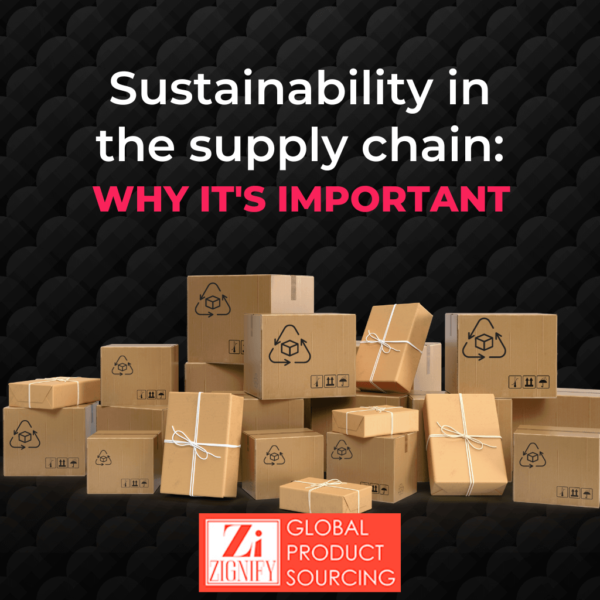
In today’s world, the term “sustainability” is more than just a buzzword—it’s a guiding principle that shapes the way businesses operate. One area where this principle is making a significant impact is in the supply chain.
Statistics from the Greenly Institute reveal that companies with sustainable procurement practices have as much as 15-30% increase in brand value, meaning customers find more value in them. Now more than ever, businesses are embracing sustainability in their supply chains.
A sustainable supply chain isn’t just about being environmentally friendly; it encompasses economic and social responsibility as well. The concept of sustainability has taken center stage. More and more companies are realizing the importance of integrating sustainability into their supply chains.
What Is Supply Chain Sustainability, Anyway?
Let’s start with the basics. Supply chain sustainability is all about ensuring that the way products are sourced, produced, and delivered doesn’t harm the environment, society, or future generations. It’s like a triple win: good for business, good for people, and good for the planet. Gartner revealed that 80% of business leaders surveyed said that their sustainability programmes helped their organizations optimize and reduce costs in response to disruptions.
In this article, we’ll dig deep into why sustainability in the supply chain is so crucial, what the benefits of a sustainable supply chain are, and explore ways you can implement a sustainable supply chain in your business.
Why is it important to have a sustainable supply chain?
- Sustainability in the supply chain can help improve social conditions. Many supply chains involve workers in developing countries who may be vulnerable to exploitation and abuse. By working with suppliers to improve working conditions and promote fair labor practices, companies can help improve the lives of workers and their families.
- Sustainability in the supply chain can help improve brand reputation. Consumers are increasingly interested in buying products from companies that are committed to sustainability. By making their supply chains more sustainable, companies can appeal to these consumers and improve their brand reputation.
- Sustainable supply chains prioritize eco-friendly practices that reduce the negative impact of industrial activities on the environment. By using renewable resources, minimizing waste, and reducing greenhouse gas emissions, these supply chains help conserve natural resources and mitigate the effects of climate change.
- Sustainable supply chains aim to lower carbon emissions through practices like using clean energy sources, optimizing transportation routes, and reducing energy consumption. This is crucial for combating climate change and meeting global emission reduction targets.
- According to a McKinsey report, 60% of US consumers would pay more for a product with sustainable packaging. Businesses with sustainable supply chains are better positioned to meet the demands of environmentally conscious consumers. They can tap into a growing market segment of individuals who prefer eco-friendly products and support socially responsible companies.
- Sustainable supply chains are more are more resilient to disruptions caused by climate-related events, resource scarcity, and regulatory changes. By diversifying suppliers and adopting environmentally responsible practices, companies can reduce their vulnerability to such risks.
- Sustainable supply chains are more likely to adhere to ethical standards, such as avoiding child labor, supporting gender equality, and respecting human rights. This promotes responsible behavior throughout the supply chain.
Benefits of a Sustainable Supply Chain
Key players in the e-commerce marketplace like Amazon have embraced sustainable supply chains; we should realize that sustainability is not a trend. It won’t go out of style or give way to a new fad. Businesses have to integrate sustainability strategies into their supply chain, as this is the new normal. There are a number of benefits to having a sustainable supply chain. These benefits include:
- Environmental Benefits:
- Reduced Carbon Footprint: Sustainable supply chains prioritize eco-friendly practices like using renewable energy sources and optimizing transportation routes. This translates to lower carbon emissions and a reduced impact on our planet’s climate.
- Resource Conservation: Sustainability involves responsible resource management. By using resources efficiently, minimizing waste, and promoting recycling, you help conserve valuable natural resources for future generations.
- Waste Reduction: Sustainability isn’t just about using fewer resources; it’s also about generating less waste. Sustainable practices encourage businesses to minimize waste through recycling and responsible disposal methods.
- Economic Benefits
- Cost Savings: While there may be initial investments in sustainable practices, they often pay off in the long run. Reduced energy consumption, lower waste disposal costs, and increased operational efficiency contribute to significant cost savings.
- Market Opportunities: Sustainability is not just a feel-good concept; it’s a selling point. Companies with sustainable supply chains can tap into a growing market of environmentally conscious consumers and attract investors who value responsible business practices.
- Risk Mitigation: Sustainable supply chains are more resilient in the face of disruptions caused by climate change, resource scarcity, or regulatory changes. This risk mitigation can protect your business from unexpected challenges.
- Social Benefits:
- Improved Working Conditions: Sustainable supply chains prioritize fair labor practices. This means better working conditions, fair wages, and opportunities for employee growth and development.
- Community Engagement: Companies that embrace sustainability often engage with local communities. They support initiatives like education, healthcare, and infrastructure development, contributing positively to the places they operate.
- Ethical Practices: Sustainability goes hand in hand with ethical business practices. On a global scale, the International Labor Organization estimates that approximately 152 million children are engaged in child labor. Companies committed to sustainability are more likely to adhere to ethical standards, such as avoiding child labor and respecting human rights.
- Long-Term Viability:
- Brand Reputation: Sustainability builds a positive brand reputation. It creates customer loyalty and trust, which can set your business apart from the competition.
- Regulatory Compliance: As governments worldwide tighten environmental and social regulations, a sustainable supply chain ensures that your business is ready to meet these evolving standards
How To Implement a Sustainable Supply Chain
So, what are the best practices to ensure that companies can implement a sustainable supply chain:
- Know Your Supply Chain Inside Out
Did you know that more than 40% of consumers surveyed in the U.S., more than 50% in Europe, and almost 70% in China say they want access to more information about how their clothes were made to better inform their shopping decisions?A crucial first step in achieving sustainability in your supply chain is transparency. You need to know where your products or materials come from and how they get to you. Document every step, from raw material sourcing to production, transportation, and delivery. Transparency helps you identify areas where sustainability improvements can be made. - Collaborate and Communicate
Sustainability isn’t a solo mission. Collaborate with your suppliers and partners. Share your sustainability goals and learn from each other’s experiences. The more you communicate, the easier it becomes to align your efforts. Suppliers can help to identify and assess risks and opportunities, and they can also help to develop and implement sustainable practices. - Set Clear Sustainability Goals
You can’t hit a target you can’t see. Set specific, measurable, achievable, relevant, and time-bound (SMART) sustainability goals. Whether it’s reducing carbon emissions, cutting waste, or using more sustainable materials, having clear objectives keeps everyone on track. - Choose Sustainable Materials
Speaking of materials, make sure you’re sourcing responsibly. Opt for eco-friendly, recycled, or renewable materials whenever possible. This not only reduces your environmental impact but also sends a positive message to customers who care about sustainability. - Reduce, Reuse, Recycle
Embrace the “Reduce, Reuse, Recycle” mantra in your supply chain. Waste reduction is a big part of sustainability. Implement strategies to minimize waste at every stage of your supply chain. This includes using recycled materials, designing products for easier recycling, and finding ways to reuse materials within your processes. Remember, less waste means cost savings too! - Develop a sustainability plan
The next step is to develop a sustainability plan. This plan should outline the steps that the company will take to achieve its sustainability goals and targets. The plan should also include a timeline for implementation and a budget. - Ethical Labor Practices
Sustainability isn’t just about the environment; it’s also about people. Ensure fair wages, safe working conditions, and ethical labor practices throughout your supply chain. Happy workers lead to a healthier, more sustainable world. - Monitor and report on progress
It is important to monitor and report on progress towards sustainability goals and targets. This will help ensure that the company is on track to achieve its sustainability goals and that it is positively impacting its supply chain.
How Zignify helps towards sustainability in the supply chain
Zignify Global is here to help you stay ahead in the sustainability race by integrating eco-friendly practices, ethical standards, and resource efficiency into every aspect of your supply chain. By connecting you with responsible suppliers and providing data-driven insights, we help you make informed decisions that align with your sustainability objectives.
With real-time tracking and analytics, you gain a deeper understanding of your operations, enabling you to identify areas where sustainability improvements can be made. Our solutions help optimize transportation routes, reduce energy consumption, and lower greenhouse gas emissions, contributing to a greener supply chain. We promote ethical business practices throughout your supply chain. Our tools and expertise can help you ensure fair labor conditions, avoid unethical practices, and uphold human rights standards.
Keeping up with evolving sustainability regulations can be challenging. Our platform streamlines compliance management, ensuring that your supply chain stays aligned with the latest environmental and social standards.
With our expertise and cutting-edge solutions, you can not only meet your sustainability goals but also thrive in a world where responsible business practices are increasingly vital. Join us on the path to a more sustainable supply chain future.
In conclusion, in a world where environmental, economic, and social challenges are increasingly intertwined, sustainability in the supply chain is not just an option; it’s a necessity. Companies that embrace sustainable practices throughout their supply chains can enjoy numerous benefits, from reducing their environmental impact to improving their financial performance and enhancing their social responsibility. By prioritizing sustainability, we can create a more resilient supply chain and an equitable future for generations to come.



